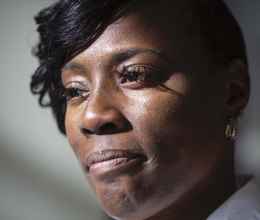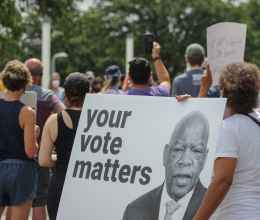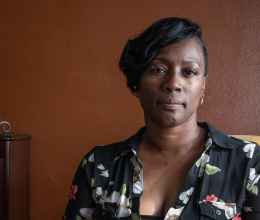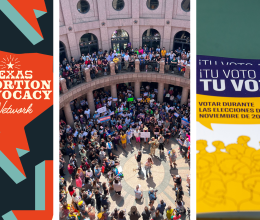
This past September, the House Redistricting Committee kicked off a series of statewide public input hearings in Austin. The purpose of these hearings is to gauge feedback from various communities throughout the state about how Texas redistricting, or the redrawing of state electoral maps, impacts all of us.
The redistricting process is extremely important. After all, it locks us into voting districts for 10 whole years, until the next census and next redistricting process starts over again. If the lines are drawn unfairly, it could mean that your voice and your vote won’t matter as much for the next 10 years!
Redistricting became a key issue for me because of my commitment to voting rights. I’m a firm believer that our vote is our power. Whenever there’s a threat to that power, our vote must become our fight as well.
So when the House Redistricting Committee made their stop in Austin, where I live, I knew I would show up and share my story.
Thanks to the redistricting trainings that the ACLU of Texas and other members of the Fair Maps Texas coalition that I am part of, I felt prepared. I recognized that the most impactful thing I could possibly do with the three minutes I had to speak was to get up and talk about my unique experience with my district and my community. The ACLU’s What The District?! tool also helped unlock just what that would be: Once I could see my district’s boundary line evolution changing over the years, I saw exactly what I’d talk about.
Hearing day came and within minutes of the doors opening to the public, it became a packed room. An overflow room soon became occupied. I didn’t feel alone because I clearly wasn’t. So many of us showed up with a story to tell and this committee was going to hear all of it.
Plenty of people were having their first time to testify in front of a committee that day. Certainly I had my moment of panic as I got up to speak of thinking, “Well here you are and you’re about to open your mouth and say things!” Thankfully words found me.
I talked about how Texas redistricting has cracked my community, impacted my family, our schools, and the surrounding communities that I share nearly everything with--well, everything except electoral representation.
I encourage all Texans to attend the public input hearings in their community. Let’s make sure lawmakers know we’re watching.
If you’re planning testimony, here are some useful tips:
- Write down what you plan to say. Even if you’re comfortable enough to know you won’t need to rely on your written words, it’s helpful to have even just some bullet points to guide you.
- Practice saying your remarks out loud, and if you can, time yourself. It helps to know if you need to tighten your message for a 2-3 minute window. That said, don’t sweat it if you go over time. In most cases, committee members will give you time to wrap up your remarks. They won’t cut your mic and play you off stage, this is not the Oscars!
- Most importantly, remember you’re just having a conversation. Tell your truth about how your voting districts impact you and your community.
It can be nerve wracking to get up in front of a formidable panel of elected officials but they are people just like you, put there by voters like us. Ultimately, I was just there to have a conversation with people elected to serve Texans. And in the simple act of showing up to have this important conversation, we become formidable too. Our vote is our power, so it must be our fight.
It’s our fight when we can’t hold our lawmakers accountable because they serve in safe districts. It’s our fight when government stops being responsive to the people because voters were carefully chosen for predetermined election outcomes. And it’s our fight when the lines we live by are crafted not with our community needs in mind but with a desire to grab and solidify power as the ultimate goal.
Additional Resources:
- ACLU's What the District?! tool
- List of upcoming field hearings in Texas
- Video on how to draft testimony
- If you aren't able to make it to the redistricting town hall in your area, you can still send a message of your testimony to the Committee members.





